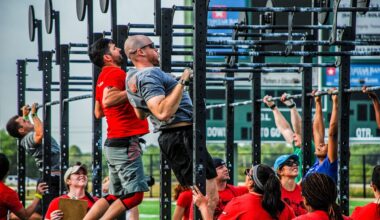Hydration and Nutrition Tips for Exercising Moms-to-Be
Staying hydrated is crucial during pregnancy, especially for those engaging in workouts during the first trimester. As your body goes through many changes, ensuring adequate fluid intake should be a priority. Aim for at least eight 8-ounce glasses of water daily, and this requirement may increase with exercise intensity. Feel free to incorporate other hydrating beverages, like herbal teas or diluted fruit juices. However, be cautious of caffeine intake and opt for caffeine-free alternatives. In addition to drinking enough water, including foods high in water content, such as cucumbers, watermelon, and oranges, can help with hydration. Keeping a reusable water bottle on hand can encourage regular sipping throughout the day. Don’t forget that your fluid needs can vary based on physical activity and climate conditions. Always listen to your body and drink when thirsty. Consistency is key, so setting reminders on your phone or app can assist in maintaining optimal hydration levels. Developing healthy hydration habits during pregnancy can also positively impact your overall well-being post-delivery. Lastly, consult your healthcare provider for personalized advice to ensure you meet your hydration goals safely while exercising.
In addition to hydration, nutrition plays a vital role as you start a workout routine during the first trimester. Eating a balanced diet rich in critical nutrients supports both your health and your baby’s development. Focus on incorporating a variety of fruits, vegetables, whole grains, proteins, and healthy fats into your meals. Leafy greens are packed with folate, essential for fetal development. Others such as berries boost antioxidants, while lean proteins, like chicken or legumes, contribute to muscle repair post-workout. A good strategy is to have smaller, frequent meals throughout the day. This enhances energy levels and prevents feelings of nausea common during early pregnancy. Pre- or post-workout snacks can also be beneficial. Some great options include yogurt with berries, nut butter on whole-grain toast, or smoothies that combine spinach, banana, and almond milk. Make sure to consume complex carbohydrates to fuel your workouts. Regularly review your diet and adjust based on your cravings and energy levels. Ultimately, finding a nutrition plan that works best for you is critical, especially as the first trimester can be unpredictable in terms of moods and appetites.
Understanding Nutrient Needs
During early pregnancy, your nutrient needs shift significantly, necessitating attention to specific vitamins and minerals for both you and your developing baby. It’s essential to focus on foods rich in iron, calcium, and vitamins D and B12, which are vital for prenatal health. Iron is instrumental in supporting increased blood volume and preventing anemia. Find iron in foods like spinach, lentils, and fortified cereals. Calcium helps develop your baby’s bones and teeth, requiring you to consume more dairy products or plant-based alternatives. Vegan options like tofu and fortified almond milk provide essential nutrients as well. Vitamin D enhances calcium absorption; thus, spending some time outdoors under sunlight while consuming fortified foods can ensure adequate levels. Moreover, B12 is crucial for brain development; consider fortified nutritional yeast or dairy if you have dietary restrictions. Always incorporate a variety of foods into your diet to cover all the necessary nutrient bases. If you’re unsure about your dietary intake, consult a healthcare professional for personalized recommendations. Tailoring your nutrition strategy can lead to better outcomes for you and your baby. So, build a diverse plate with colorful, nutrient-rich foods.
Planning your meals around workouts can make a noticeable impact on your energy levels and performance. Timing is essential when it comes to meals and snacks, especially in the early stages of pregnancy. Ideally, consume a small meal or snack containing complex carbohydrates and protein about 30 to 60 minutes before exercising. This approach provides stable energy during workouts without causing discomfort. Some great pre-exercise options include oatmeal topped with fruit or a banana with a tablespoon of peanut butter. Post-workout recovery is equally important. After exercising, aim to refill your energy stores and support muscle recovery. A combination of protein and carbohydrates can boost post-workout restoration significantly. Consider low-fat yogurt with granola or a protein smoothie featuring spinach, bananas, and protein powder. Listening to your body also plays an essential role in understanding your hunger signals. If a workout feels particularly challenging, examine your overall nutrition and hydration strategy. Adjust portions according to your exercise levels. Don’t ignore cravings; they can indicate specific nutrient deficiencies. Adopting a mindful approach will optimize both your fitness routine and overall health.
Choosing the Right Hydration Sources
Being mindful of the hydration sources you choose can also enhance your pregnancy fitness experience. While water should be your primary beverage, other options can prevent fatigue during workouts and throughout the day. Coconut water is a fantastic natural electrolyte source, providing hydration without added sugars found in sports drinks. If you prefer flavored beverages, consider infusing water with fruits like lemon, berries, or mint. Herbal teas can also serve a dual purpose of hydration and calming your digestive system during early pregnancy. However, it’s crucial to avoid any caffeinated or overly sweetened drinks. In addition, pay attention to commercial sports drinks and flavored waters. Check labels for added sugars and unnecessary chemicals, which can be counterproductive during pregnancy. Making your beverages can be a fun and beneficial way to stay hydrated. Remember to listen to your body’s thirst signals and think about adjusting intake based on workout intensity. Staying hydrated is not just about quantity; it’s also about quality. Adopting these strategies will elevate your overall fitness journey during early pregnancy while supporting both you and your baby.
As you engage in pregnancy workouts, maintaining a strong connection between hydration, nutrition, and overall wellness is paramount. It helps you manage changes in your body while ensuring your baby receives vital nutrients for healthy development. By prioritizing hydration and nutrition, you can navigate the potentially challenging aspects of the first trimester more manageable. Take the time to explore new recipes that emphasize fresh, nutrient-dense ingredients, which can be enjoyable for you while nourishing your body. Experiment with cooking techniques that maintain food integrity to retain maximum nutrients, such as steaming vegetables or grilling proteins. Keeping a food journal can also be beneficial to track your dietary patterns, hydration levels, and emotional responses to specific foods, helping you make informed choices. Consider collaborating with a registered dietitian who specializes in prenatal nutrition for tailored guidance. They can assist in the planning of meals and snacks suited to your unique needs during pregnancy. Healthy food should bring joy rather than stress, making it essential to maintain a positive mindset toward nutrition. Your overall well-being is vital as it directly affects your baby, so invest time into creating healthy habits early on.
Seeking Professional Guidance
Consulting health professionals is always a recommended step, especially regarding fitness and nutritional needs during pregnancy. Physical activity must be approached with extra caution, given the unique changes occurring in your body. Speak with your healthcare provider or a prenatal fitness specialist to ensure that you’re developing a suitable exercise routine. Additionally, a registered dietitian can provide valuable direction on meeting your dietary needs while considering personal preferences. Guidelines may vary depending on individual circumstances, such as pre-existing health conditions or dietary restrictions. Having professionals in your corner can offer you reassurance and personalized strategies to stay healthy and active. Online resources can be beneficial but may not cater to your specific situation. Make sure to validate the information you acquire with qualified professionals. They can also help you recognize signs that might indicate the need for changes in hydration or energy intake. Remember, every pregnancy is different, so what works for one person may not work for another. Prioritizing personalized wellness will support you and your baby’s progress, allowing you to relish the journey of motherhood during the initial exciting months.
Maintaining a balanced approach is paramount throughout your early pregnancy journey, especially when exercising. Focusing on hydration and nutrition offers benefits beyond mere physical fitness. This holistic approach contributes to emotional stability, energy levels, and overall well-being. Emphasizing self-care during this transformative time can positively impact not only your health but also your baby’s development. Practicing mindfulness with both meals and hydration will improve your connection to your body’s needs. Acknowledge that cravings and aversions can often arise, especially during the first trimester, and that these fluctuations are normal. Allow yourself flexibility in your nutrition choices while keeping your main goals in mind. Engaging in gentle forms of exercise like yoga or walking can help enhance your mind-body connection alongside focusing on hydration and nutrition. Lastly, communicate openly with your support system about your needs and experiences, as sharing can ease any uncertainties. Recognize the importance of rest and recuperation in addition to being active. Embracing this balance will equip you to enjoy a fulfilling and healthy pregnancy experience, paving the way for an energized transition into motherhood and beyond.


